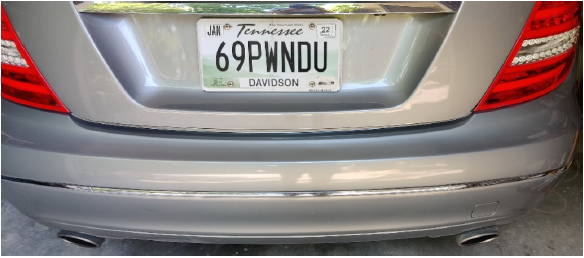While the state of Tennessee cannot censor billboards, it can censor your vanity license plate but a new lawsuit hopes to change that.
A Nashville woman has sued state officials after they revoked a vanity license plate that she’s had on her car for more than 10 years. Leah Gilliam is described as “an astronomy buff and a gamer” in the lawsuit filed against the Tennessee Department of Revenue.
To marry those loves, she ordered and received a vanity license plate for her car that reads “69PWNDU.” Her lawyers say the “69” part references the 1969 moon landing. The “PWNDU” part references “pwnd,” a common gaming term for “owned.” So, “pwndu” means “owned you,” or something like “I have dominated you in this video game.”
“I understand that displaying my personalized license plate in the interim will subject me to civil and potential criminal consequences,” Gilliam wrote in the suit. “To the best of my knowledge, my license plate has never caused anyone harm, and other people enjoy seeing it.”
Gilliam has “harmlessly” displayed the plate ever since, her attorneys said. That is, until she received a “threat letter” from the the Vehicle Services Division of the Tennessee Department of Revenue. That letter said her ”personalized plate has been deemed offensive.”
According to the department, state law allows it to “revoke a personalized registration plate that has been deemed offensive to good taste or decency.” It did just that. The department told Gilliam she had to “immediately” return her revoked plate and that she could apply for a new plate. However, “you will be unable to renew your vehicle registration until this plate has been returned.”
Gilliam’s lawyers argue the Tennessee law banning “offensive” vanity plates is an ”unconstitutional statute that expressly discriminates on the basis of viewpoint.”
“Governmental discrimination on the basis of viewpoint is forbidden in any forum,” reads the lawsuit. “And although the sole basis for the department’s decision to revoke Ms. Gilliam’s vanity plate is that it ‘has been deemed offensive,’ the U.S. Supreme Court has clearly established that: ‘Giving offense is a viewpoint.’”
If Gilliam does not comply with the state’s order to get a new license plate, she faces a fine and up to 30 days in jail. Her attorneys sued on violations of her First Amendment rights to free speech and her Fourteenth Amendment rights as the Tennessee law is constitutionally vague.
Gilliam and her attorneys want the state to temporarily stop enforcing the vanity license plate laws (and from revoking her plate) until the case is settled. After the verdict, her attorneys want a permanent ban on revoking such plates and for the court to rule Tennessee’s vanity-plate law unconstitutional.
She’s also seeking court costs, attorney’s fees, and damages of $1 per day that she was forbidden from displaying her vanity plate.
The case is set for a hearing in August.
